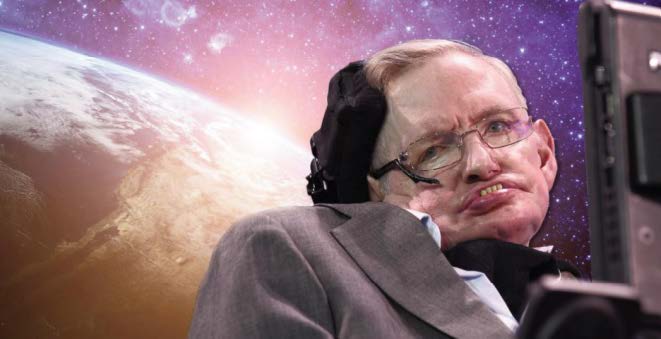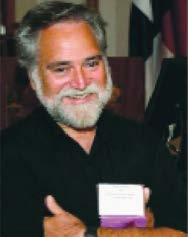Black Holes, Wheel Chairs and a Familiar Voice
Like Hawking, readers of Exceptional Parent magazine have long fought to have their "voices" heard. They come in numerous accents, decibels and emotions. They are sometimes shouted, sometimes repeated and often done in unison.
In 1988 I was one of several million people worldwide who purchased Stephen Hawking's best seller, "A Brief History of Time". The book was promoted as providing a very simple and understandable explanation of cosmology, space and time, black holes and string theory. The book was an instant best seller, translated into more than 40 languages, and spent more than four years atop the London Sunday Times' best-seller list.
I thought this was my ticket to sounding intelligent at the many Friday night Manhattan parties I wormed my way into during my single days. I was hoping that Professor Hawking would provide me with enough juice to get me through the first five minutes of someone (a blonde, typically) asking me what I thought of gravitational singularity theorems. I blew it. It might have been written in one of the 39 other languages the book was translated into. I read it twice before I gave up on it. Millions of readers applauded it openly but, apparently, they were as clueless as I was. In 2005, Hawking authored the sec ond attempt at explaining the unexplainable and a new version of "A Briefer History of Time" was released. By that time, I knew enough to know enough was enough. To this day the only thing I realize I could have shared about Hawking was the time I spent doing an elective clinical rotation at Addenbrooke's Hospital at the Cambridge University's School of Clinical Medicine. I drew blood from him one evening and thankfully got it on the first stab.
Hawking, who recently passed away a the age of 76, defied all the predictions of a patient with Lou Gehrig's disease (amyotrophic lateral sclerosis) where the majority of patients die within two years of the diagnosis. It's a cruel disease where the nerves that control your muscles begin to methodically and systematically shut down.
In the great British tradition, Hawking pressed on regardless. Much of his stamina, perseverance and positive outlook came from sharing a hospital room with a patient with leukemia. Hawking thought that his condition was tolerable compared to what the dying boy went through.

STAR QUALITY: Hawking was a world-famous cosmologist and theoretical physicist, but his "press on regardless" demeanor propelled him to rock stardom.
In 1985, Hawking, following a tracheotomy, lost his voice forever and required 24 hour nursing care for the rest of his life. The loss of Hawking's voice cast a shadow on his ability to do his work. At this time a California computer programmer was developing a speaking program that could be directed by head or eye movement. The device allowed Hawking to select words on a computer screen that were then passed through a speech synthesizer. This was activated with a handheld clicker until he lost all control of his body. From then on, he activated the program through a cheek muscle attached to a sensor.

In addition to his contribution to theoretical physics he was a promoter and advocate of applying technology to assisting people with disabilities. He worked with software engineers from Intel in developing a program called ACAT and released it as an open-source software program in 2015 so that anyone could access and adapt the pro gram for their own needs. His ability to continue to lecture all over the world provided him with a second chance. In 1993 he shared his appreciation for "speaking."
"Speech has allowed the communication of ideas, enabling human beings to work together to build the impossible. Mankind's greatest achievements have come about by talking, and its greatest failures by not talking. It doesn't have to be like this. Our greatest hopes could become reality in the future. With the technology at our disposal, the possibilities are unbounded. All we need to do is make sure we keep talking."
Over the years Hawking still used the aging program that provided his wellknown synthetic voice. Despite newer advances in speech technology he preferred his "old voice," and was reluctant to give it up, despite the fact that he thought it gave him an American accent. Thirty years of use had resulted in the decay of the original software. The original software engineer, Eric Dorsey, worked tirelessly in preserving and upgrading the original program that allowed Hawking to continue to sound like he always had. The poet Longfellow wrote that the human voice is "the organ of the soul," and even if that voice was computer generated, it was important for Hawking's legacy to remain loyal to that early voice.
"Longfellow said that the human voice is "the organ of the soul," and it was important for Hawking's legacy to remain loyal to that early voice."
Hawking was a world-famous personality as a cosmologist and theoretical physicist, but his disability and his "press on regardless" demeanor propelled him to rock stardom. My favorite Stephen Hawking quote was a reflection of that, "I can disguise myself with a wig and dark glasses – the wheelchair gives me away."
Like Hawking, readers of Exceptional Parent magazine have long fought to have their "voices" heard. They come in numerous accents, decibels and emotions. They are sometimes shouted, sometimes repeated and often done in unison.
One thing remains true for every generation of the exceptional parent movement, and that is the sound of T.S. Eliot in Four Quartets: "For last year's words belong to last year's language. And next year's words await another voice. •